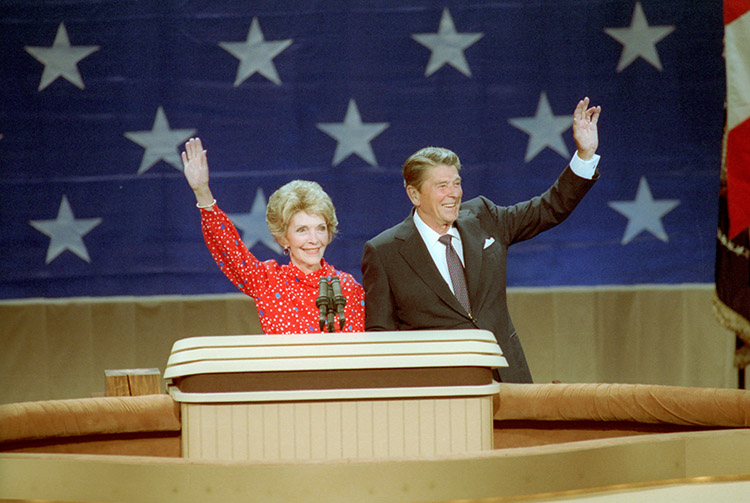
Ronald Reagan, the 40th President of the United States, is widely regarded as one of the most influential leaders in modern American history. His economic policies played a crucial role in shaping the country’s financial landscape during his two terms in office. The 1984 election was a pivotal moment for Reagan and his administration, as he sought to secure another term amid growing concerns about the nation’s economy.
Ronald Reagan’s economic policies were a key factor in his election victory in 1980. His tax cuts, deregulation of industry, and support for free trade helped to spur economic growth and create jobs. However, his policies also led to large budget deficits, which became a major issue in the 1984 election.
Reaganomics Overview
In the 1980s, President Ronald Reagan’s economic policies, collectively known as “Reaganomics,” had a profound and lasting impact on American society and politics. Reaganomics was based on the principles of supply-side economics, which holds that tax cuts can spur economic growth by freeing up resources for investment and innovation.
During his two terms in office, Reagan slashed marginal income tax rates, reduced regulations on business, and increased military spending. While critics argue that Reaganomics led to widening income inequality and ballooning budget deficits, supporters credit it with igniting a period of strong economic growth in the United States.
The legacy of Reaganomics continues to be hotly debated in the political arena, particularly in light of the current economic recession. As we head into another presidential election, it’s important to understand how Reagan’s policies shaped our economy and continue to influence our nation’s debates about taxation, government spending, and the role of government in the marketplace.
Tax Cuts and Increased Military Spending
During his presidential campaign, Ronald Reagan promised tax cuts and increased military spending. He promised to cut taxes by $150 billion over six years and to increase defense spending by $1.2 trillion over the same period. He also promised to create 20 million new jobs and reduce the federal deficit by $700 billion.
Reagan’s tax cuts were implemented in 1981 and 1982. The Tax Reform Act of 1986 lowered marginal rates, eliminated many deductions, and closed loopholes. The result was a simpler tax code with lower rates for most taxpayers. Reagan’s defense spending increases were also implemented, though not at the levels he initially proposed.
Reagan’s economic policies had a significant impact on the 1984 presidential election. His tax cuts helped spur economic growth, which led to increased government revenue and helped reduce the federal deficit. His defense spending increases helped win him support from voters who were concerned about national security. Ultimately, Reagan’s policies contributed to his landslide victory in the 1984 election.
Impact on the 1984 Election
In the 1984 election, Ronald Reagan’s economic policies had a significant impact. His tax cuts, deregulation, and spending increases helped to boost the economy and create jobs. These policies also helped to reduce the budget deficit. Reagan’s opponents criticized his policies as being too costly and benefiting the wealthy instead of the middle class. However, Reagan’s economic policies were popular with voters and helped him win re-election in a landslide.
Reagan’s Campaign Strategies
In his 1980 presidential campaign, Ronald Reagan promised Americans that he would revive the economy and reduce inflation. He proposed supply-side tax cuts, which he claimed would spur economic growth. To reduce government spending, Reagan advocated for cuts to social welfare programs like Medicare and Medicaid. He also promised to reduce regulation of businesses and industry.
Reagan’s campaign rhetoric was effective in winning over voters who were concerned about the state of the economy. His economic policies, however, did not have the desired effect once he took office. The supply-side tax cuts led to increased deficits and ballooning national debt. The cuts to social welfare programs left many vulnerable Americans without access to healthcare or other basic needs. And the deregulation of business and industry led to a number of corporate scandals and an overall decline in economic growth.
While Reagan’s economic policies may have been unsuccessful, they did win him widespread support among voters during his presidential campaigns.
Impact of the Economy on Voter Support
The election of Ronald Reagan in 1980 was a watershed moment for the American economy. Reagan’s policies of tax cuts and deregulation helped spur a period of economic growth and prosperity that lasted for more than two decades. However, not everyone benefited from this economic boom. In particular, many working-class and middle-class Americans saw their incomes stagnate or decline during this time.
As the country has faced economic challenges in recent years, voter support for Reagan’s policies has eroded. In the 2016 presidential election, both major party candidates ran on platforms that were critical of Reaganomics. And while Donald Trump ultimately won the election, it is worth noting that he did so while losing the popular vote by nearly 3 million votes.
It is clear that the economy continues to have a major impact on voting patterns in the United States. As the country experiences periods of economic growth or recession, voters will likely respond accordingly at the polls
Ronald Reagan’s economic policies had a significant impact on the 1984 presidential election. His policy of supply-side economics, lowering taxes and increasing defense spending, allowed for growth in the economy, leading to an increase in employment opportunities and general prosperity. This ultimately gave Reagan an edge over his Democratic rival Walter Mondale who was unable to compete with Reagan’s economic success. As such, it can be argued that Reagan’s economic policies were key to his victory in the 1984 election.
Leave a Reply